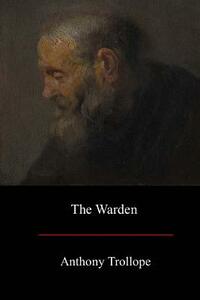Take a photo of a barcode or cover
emotional
funny
informative
reflective
relaxing
sad
medium-paced
Plot or Character Driven:
A mix
Strong character development:
Complicated
Loveable characters:
Complicated
Diverse cast of characters:
No
Flaws of characters a main focus:
Complicated
This is a Victorian novel with a bit of social satire. The reader, the late actor Timothy West, helps convey this satire, along with the author’s Dickensian tendency to name characters according to their qualities (e.g., John Bold, Rev. Quiverfull who has 12 children), but there’s also an appearance of a parody Dickens-type novel titled “The Almhouse,” by an author called “Mr. Popular Sentiment.” The action is mostly conversational and emotional, though there’s a great episode of an evening party described as an extended metaphorical battle, that’s subtly hilarious. To some extent, the more you know about Victorian society and literature, the more you’ll enjoy this novel. But if you’re patient with it, the characters will get to you in the end.
3.5
What is any public question but a conglomeration of private interests?"
After nearly ten years of wanting to read this novel, and try Trollope, I have finally managed it. I don't know why I was so hesitant. This is a good Victorian novel, admitedly not my favourite, but worth reading nonetheless.
The story revolves around the question of the possible misuse of charitable funds. The reformer side is personalised by Mr. Bold, while the holder of the warden position is Mr Harding. Both sides are shown very well, personal and social spheres included. Trollope also adds many complicating elements to the equation. Mr Harding is a genuine and caring person, doing his job with heart, while Mr Bold is not a bad person per se, but rather someone who gets taken by his ideals without considering what this battle will mean or grow into. He is actually a friend of the current warden and in love with his daughter! Trollope didn't just focus on the Church either; other institutions were also scrutinised such as the Press. Mostly, what comes across again and again is that behind good intentions there are many people more interested in their own interests then on rectifying possible wrongs.
Through his writing, the author made me feel the plight of the poor warden and his situation. His main characters were well drawn, full of realistic contradictions and quirks. Many scenes and descriptions, such as the ones of the party, or Mrs Grantly's discussion with her husband, were delightful and not devoid of humour. I look forward to the next instalment of the Chronicles of Barsetshire.
What is any public question but a conglomeration of private interests?"
After nearly ten years of wanting to read this novel, and try Trollope, I have finally managed it. I don't know why I was so hesitant. This is a good Victorian novel, admitedly not my favourite, but worth reading nonetheless.
The story revolves around the question of the possible misuse of charitable funds. The reformer side is personalised by Mr. Bold, while the holder of the warden position is Mr Harding. Both sides are shown very well, personal and social spheres included. Trollope also adds many complicating elements to the equation. Mr Harding is a genuine and caring person, doing his job with heart, while Mr Bold is not a bad person per se, but rather someone who gets taken by his ideals without considering what this battle will mean or grow into. He is actually a friend of the current warden and in love with his daughter! Trollope didn't just focus on the Church either; other institutions were also scrutinised such as the Press. Mostly, what comes across again and again is that behind good intentions there are many people more interested in their own interests then on rectifying possible wrongs.
Through his writing, the author made me feel the plight of the poor warden and his situation. His main characters were well drawn, full of realistic contradictions and quirks. Many scenes and descriptions, such as the ones of the party, or Mrs Grantly's discussion with her husband, were delightful and not devoid of humour. I look forward to the next instalment of the Chronicles of Barsetshire.
lighthearted
relaxing
medium-paced
Plot or Character Driven:
Plot
Strong character development:
No
Loveable characters:
Yes
Diverse cast of characters:
No
Flaws of characters a main focus:
Yes
I didn't hate this... it was just 284 pages too long. Really you get everything you need by reading the book's back copy.
This was my first introduction to Anthony Trollope, and his writing style was fine and light--it was just the content that bored me out of my mind. I liked his hyperbole allusions. For example, there is a party, and the courting of the young men and women at the party is described as a battle. That was unique. The description of a successful journalist is made out as describing a god who lives on Mount Olympus, "compound[ing] thunderbolts for the destruction of all that is evil" (179). That was fun, except that it halted the plot entirely just to describe him for an entire chapter. (Another entirely random chapter, aptly titled "A Long Day in London," is spent describing how the warden waits around until his appointment. These two random chapters are my favorite in the whole book.). Two other successful reformers had fun names, Dr. Pessimist Anticant and Mr. Popular Sentiment--I love when authors do this.
The plot didn't resolve any of the problem that this book was made to describe. Maybe that was the point. But after all the effort from the reform petition and articles and lawyers involved, the case is dropped, the nice warden cowardly resigns, and the bedesmen don't get what they'd wanted in the first place. And the warden's daughter marries the reforming bedesman ringleader, sort of as an afterthought. It was all so anticlimactic.
This was my first introduction to Anthony Trollope, and his writing style was fine and light--it was just the content that bored me out of my mind. I liked his hyperbole allusions. For example, there is a party, and the courting of the young men and women at the party is described as a battle. That was unique. The description of a successful journalist is made out as describing a god who lives on Mount Olympus, "compound[ing] thunderbolts for the destruction of all that is evil" (179). That was fun, except that it halted the plot entirely just to describe him for an entire chapter. (Another entirely random chapter, aptly titled "A Long Day in London," is spent describing how the warden waits around until his appointment. These two random chapters are my favorite in the whole book.). Two other successful reformers had fun names, Dr. Pessimist Anticant and Mr. Popular Sentiment--I love when authors do this.
The plot didn't resolve any of the problem that this book was made to describe. Maybe that was the point. But after all the effort from the reform petition and articles and lawyers involved, the case is dropped, the nice warden cowardly resigns, and the bedesmen don't get what they'd wanted in the first place. And the warden's daughter marries the reforming bedesman ringleader, sort of as an afterthought. It was all so anticlimactic.
slow-paced
Plot or Character Driven:
A mix
Strong character development:
No
Loveable characters:
No
Diverse cast of characters:
No
Flaws of characters a main focus:
Yes
Perhaps I'm 150 yeas or so too late to enjoy this book, but I've read others from even before and they were enjoyable. There's little really to recommend this book to a modern reader - the plot makes sense and the characters do fit well into it.
But the writing style just doesn't work. The first 10% of the book doesn't have a single dramatized scene. When the book does bother to dramatize a scene, it often skips over entire sections of dramatics by narrating those parts of the scene. The sheer amount of narration makes it hard to really get into the book on an emotional level or care whatsoever about any of the characters.
On a thematic level, Trollope's utter disdain for the concept of reform grates hard. Those chasing reform are motivated in large part by greed, while those with more than they should have (not that Trollope thinks it's really more than they should have) are framed as deserving. Trollope even lessened the amount that was being argued over to dampen the "problems" of the funding of church figures.
Also, as one might expect in a book of the time, he really needs to write his women better.
But the writing style just doesn't work. The first 10% of the book doesn't have a single dramatized scene. When the book does bother to dramatize a scene, it often skips over entire sections of dramatics by narrating those parts of the scene. The sheer amount of narration makes it hard to really get into the book on an emotional level or care whatsoever about any of the characters.
On a thematic level, Trollope's utter disdain for the concept of reform grates hard. Those chasing reform are motivated in large part by greed, while those with more than they should have (not that Trollope thinks it's really more than they should have) are framed as deserving. Trollope even lessened the amount that was being argued over to dampen the "problems" of the funding of church figures.
Also, as one might expect in a book of the time, he really needs to write his women better.
slow-paced
slow-paced
lighthearted
reflective
medium-paced
Plot or Character Driven:
A mix
Strong character development:
Yes
Loveable characters:
Yes
Diverse cast of characters:
No
Sir Abraham Haphazard - now that is a great name. Not much of a plot in this book, but Trollope's characters are as charming as always. Some terrific satirical moments, and the comments about the media are still spot on today. The first of his Chronicles of Barsetshire, the rest of which I hope to read this year.
A beautifully written tale about an almost trivial conflict. But even small conflicts reveal character.
Trollope reminds me of Dickens with the twee removed. The bad guys aren't ridiculous, the characters aren't caricatures. He doesn't have as high highs as Dickens, but the writing is both well done and honest.
I am especially fond of how Trollope discusses conflict. Today there is so much contempt with people you don't agree with. In this story, it is essential for the main character to treat everyone with respect and dignity. And, for the most part, vice versa.
This is a new author for me, and I am certain I will be reading him again soon.
—-
2024: What a joy to reread a book one has loved and find it even better than the first time.
Trollope reminds me of Dickens with the twee removed. The bad guys aren't ridiculous, the characters aren't caricatures. He doesn't have as high highs as Dickens, but the writing is both well done and honest.
I am especially fond of how Trollope discusses conflict. Today there is so much contempt with people you don't agree with. In this story, it is essential for the main character to treat everyone with respect and dignity. And, for the most part, vice versa.
This is a new author for me, and I am certain I will be reading him again soon.
—-
2024: What a joy to reread a book one has loved and find it even better than the first time.




